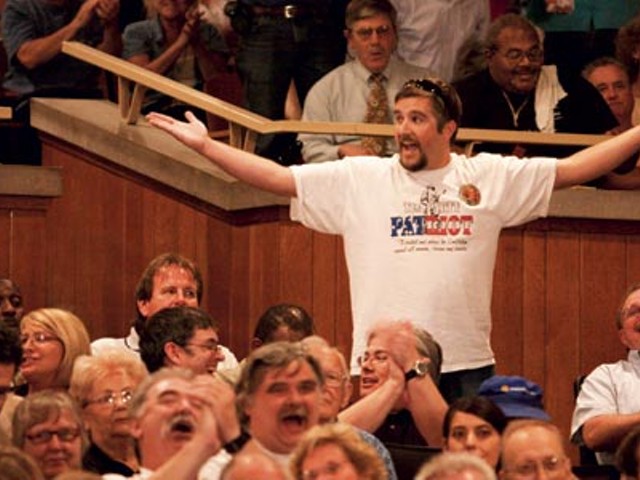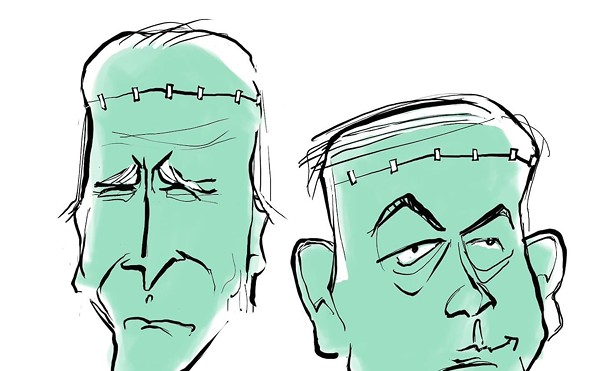To Clarify
In the Sept. 9 column Jerry’s Kids, we reported that Metro government spent a total of $32,862.17 on booze. That expenditure reflected the amount the city reimbursed businesses that had overpaid for alcoholic beverage licenses, not an indulgence in the finer flavors of life.
Importance of Art
In response to the review of the Louisville art scene by Craig Bunting (Sept. 2, LEO Weekly): For more than four decades, the German artist Hans Haacke has intelligently, rigorously and relentlessly made art that addresses the interrelatedness of socio-political, economic and cultural systems. He was part of the activist artist group The Art Workers’ Coalition in the late 1960s, and his one-person exhibition at The Guggenheim Museum was cancelled by then-director Thomas Messer because it included photographs and maps of the holdings of slumlords in New York. His other works have included revealing the unsavory political and environmental practices of corporations owned by major art supporters and collectors. I remember him saying once, “There is not a sculpture or painting that can stop a war.” But that did not stop Haacke from making politically engaged art, because he saw the importance of art as an argument for freedom.
What Bunting is asking for is that art serve a pre-ordained, or a prior identifiable function — the very thing repressive countries and groups dictate. Artists do have a responsibility to take risks, to challenge and commit themselves to “creating their own, unforeseen function,” says writer, professor and international artist David Robbins. He goes on to say, “Not all art should be about expressing earnest hope for the improvement of the species, though. Ask Baudelaire. Ask Wilde. Anyway, in general I’d say artists should concentrate on making real behavioral innovations. Let the audience decide their importance.”
Yes, the global, multinational political and economic situation is dire, and “a common goal” should be to “change the world,” as Bunting mentioned in his essay. But what is at stake here is the glorious freedom of the imagination. Without it, we would be robbed of our humanity, aliveness and dignity, as well as infinite ways to change our minds, hearts and souls forever.
Suzanne Weaver, Curator of Contemporary Art, Speed Museum of Art
Lost Limitations
I was disappointed to read Craig Bunting’s “Lost Leader: A review of the Louisville art scene,” in the 2009 A&E Guide. Apparently, to Bunting, art that does not express activist political protest has no value and is beneath his notice. He sees everything through the lens of leftist political struggle. Please. This article said more about the limitations of Bunting’s point of view than it did about the limitations of the Louisville art scene.
I am well aware that political movements for justice and freedom are worthy and powerful subjects for visual art. But so are these: love and loss; madness; healing; the power and wonder of nature; sublime flights of the spirit; and generally the often hilarious paradox that is human nature. The Louisville art scene has all of this and more.
Bunting, I hope you can lighten up and allow yourself to value the full range of human experience and artistic expression going on around you. LEO editors, I hope next time you can publish an article that defines the Louisville art scene by what is present, instead of defining it exclusively by what is absent.
Martha Rosenfeld, Germantown
Editor’s Note: Every bit of the other content in that feature, which spanned 29 pages, attempted to catalog, present and interpret the myriad elements of Louisville’s arts scenes.
Family Tree
I just finished reading Cary G. Stemle’s article “The kids on the bus” (LEO Weekly, Aug. 19), and I am flooded with emotion. First, I am outraged that the derogatory comments made about Engelhard Elementary School were allowed to be published as fact. Gina Gatti’s impression that the “school felt dead” and that “students go home to that kind of environment” is insulting to the students, parents, teachers and community members who have worked so hard to create a school that is not only alive but thriving. “Our students,” not “those kids,” walk through our doors every day into a safe, caring environment. They know, without a doubt, that they are in for a day of challenging work and high expectations — both of which they willingly rise to meet and exceed. We don’t play “surrogate” mom. Our students have moms. In addition, they have dads, grandmas and grandpas who love them very much and provide homes that are rich in support and encouragement.
Vicky Layne, Louisville
Good Soldier
Attn: Dominic Russ: I want to let you know that in my humble opinion, yours is the best piece of literary work (LEO Weekly, “Soldier,” Sept. 9) this magazine has published in the last four years. I have been a regular Leo reader since the days it was a paper rag, and I felt the real literary “fiber” disappeared when the slick new Leo appeared. The change in format seemed to bring a more “politically correct” bent to the writing; no one seemed to be taking the time to look behind the BS that is served to us daily as “news,” to delve into the real issues of the time. And that is a shame, because once upon a time, this publication did that very thing.
But your article challenged that mindset. It was enlightening, poignant and presented without any apparent bias or attempt to use the space to further your political agenda. In my opinion, you did a great service by shining a light on a group of men and women who are enduring mental and physical duress that the majority of us cannot even begin to imagine. Your point made about the reintegration of these veterans into our society is very well taken — what is the plan? By and large, this war has been kept well below the level of consciousness for the majority of the public. But it is returning to us persons with tremendous physical and psychological damage. We owe them. How do we take care of them?
Rick Dugan, Highlands
Bad Monopoly
Sarah Kelley notes correctly that “everyone knows a monopoly is bad” (LEO Weekly, Sept. 2). But a lot of people seem content to tolerate government-run entities with tremendous monopoly power — in the provision of elementary and secondary education. This monopoly power is especially great over those with few economic resources. Why do we put up with this monopoly?
D. Eric Schansberg, Professor of Economics at IUS
Bridges Smidges
I see in the C-J that unless everything is in place by the end of the year, the long-ballyhooed and frequently discussed bridges project will once again be shelved. Why is that not a surprise?
Most residents of the Metro area have long favored the sensible one-bridge-at-a-time plan with the East End bridge being the logical first choice. Public authorities have refused to take a poll or a vote in this regard. Those with even a modicum of intelligence realize that a smaller project will be cheaper and have a better chance of actually being accomplished, yet it seems that our “leadership” has not been fully attuned to citizen sentiment or input. Anne Northup favored this approach and was voted out of office.
We have officials who have straddled this issue successfully for years. Their strategy seems obvious: “Publicly support the bridges while privately oppose.” The technique is to develop a plan so costly, complex and possibly unnecessary as to make funding impossible. Once again, private interests win and the “all or nothing” planners yield the inevitable result, and we will be left with “nothing” while other cities, large and small, somehow are able to build or rebuild bridges. One more time, we are left in the dust of their progress. How frustrating and sad. Anyone want to take a guess at how much greater the costs will be in another few years, or the next decade?
Irvin Goldstein, Hikes Point
Think Before Venting
We Americans are an impulsive people. If a thought — any thought — pops into our minds, we must share it spontaneously. Our collective attention span is dangerously short. Oh, we might forget, so let’s get it out on the table. Now!
Vent! Vent! Vent! Venting is very good for the soul of America, but very bad for the one maligned. Talk radio equals ranting — a national pastime. Town hall meetings equal shouting — a national disgrace.
But, pray tell, what is the quality of our messages? Stop for one refreshingly brief moment and consider: Will my words hurt or harm? Will they be misunderstood? Am I speaking to befriend or belittle or to put myself on a pedestal? Can my impulsive words wait — at least while they undergo one good revision? Are my words simply hot air enflaming an already red-hot public discourse with all talk and no listening?
Or, quite possibly, is what I am about to utter the rarest of rarities: thoughtful remarks meant to enlighten and inform while remaining civil?
Ron Cooper, Hikes Point





